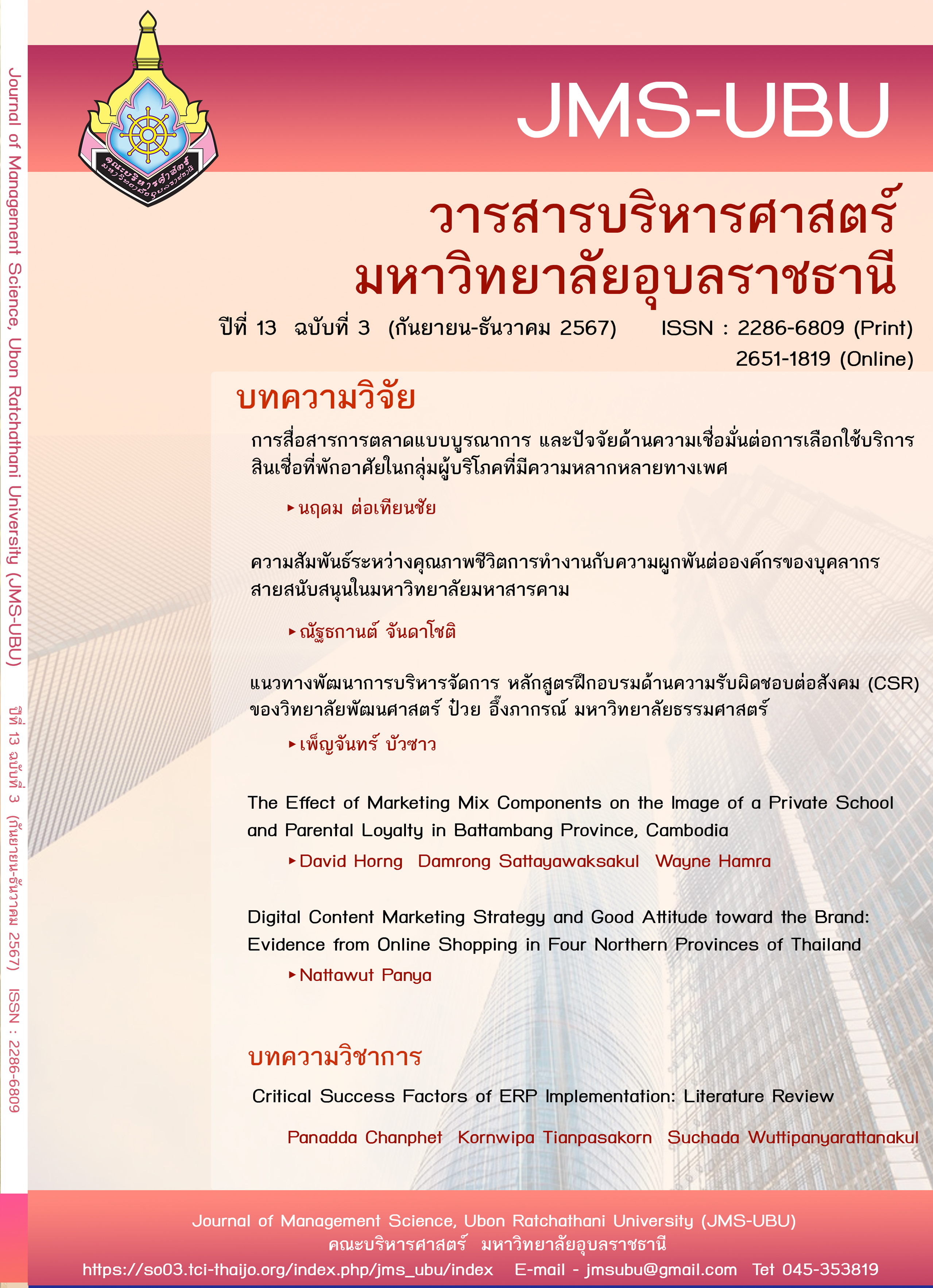Guidelines for Developing Training Management in Corporate Social Responsibility (CSR) Programs at the Puey Ungphakorn School of Development Studies, Thammasat University
Main Article Content
Abstract
This study aimed to analyze the challenges and obstacles in developing management approaches for Corporate Social Responsibility (CSR) training courses at the Puey Ungphakorn School of Development Studies, Thammasat University, during 2018–2022. It also sought to synthesize strategies for course management improvement. A qualitative approach was employed by reviewing relevant documents and collecting data from executives, department heads, and staff through in-depth interviews and focus group discussions. The data were analyzed using descriptive methods.
The findings identified two main factors contributing to challenges and obstacles: (1) internal factors, such as insufficient budget allocation and lack of continuity in prioritizing tasks, and (2) external factors, including delays in submitting training application documents, incomplete fee payments, the COVID-19 pandemic, and natural disasters. Development strategies were synthesized using the PDCA quality cycle and included an implementation plan for 2023–2024. Recommendations emphasized budget management, streamlining document submission processes, adopting online training, and enhancing risk management. These strategies have the potential to improve operational efficiency, address existing challenges, and mitigate future issues in CSR training course management.
Downloads
Article Details

This work is licensed under a Creative Commons Attribution-NonCommercial-NoDerivatives 4.0 International License.
All articles published in the Journal of Management Science, Ubon Ratchathani University are copyrighted by the journal. The views and opinions expressed in each article are those of the authors and do not necessarily reflect the views of the Faculty of Management Science, Ubon Ratchathani University. The authors are solely responsible for the content of their articles.
References
กรมโรงงานอุตสาหกรรม. (2565). พิธีลงนามบันทึกข้อตกลงความร่วมมือระหว่างกรมโรงงานอุตสาหกรรม กระทรวงอุตสาหกรรม กับ วิทยาลัยพัฒนศาสตร์ ป๋วย อึ๊งภากรณ์ มหาวิทยาลัยธรรมศาสตร์. สืบค้นเมื่อ 1 มิถุนายน 2567, จาก https://www.diw.go.th/webdiw/pr64-164-2/
จตุพร พิทักษ์พลรัตน์. (ม.ป.ป.). คู่มือปฏิบัติงานการจัดทำและดำเนินการโครงการฝึกอบรม แบบไม่เก็บค่าลงทะเบียน.ขอนแก่น: มหาวิทยาลัยขอนแก่น, คณะวิศวกรรมศาสตร์.
ชนานันท์ ทิมวัฒน์. (2564). การประเมินแผนบริหารความต่อเนื่องเพื่อเตรียมความพร้อมต่อสภาวะวิกฤตในสภาวะโรคระบาดติดเชื้อไวรัสโคโรนา 2019 ระลอกที่ 2 (ธันวาคม 2563–มีนาคม 2564) ของกรมตรวจบัญชีสหกรณ์ในพื้นที่เขตกรุงเทพมหานคร. (การค้นคว้าอิสระปริญญามหาบัณฑิต). มหาวิทยาลัยธรรมศาสตร์, คณะรัฐศาสตร์.
ฐกฤต ขอบอรัญ. (2565). การเปิดรับสื่อและทัศนคติที่มีต่อการดำเนินงานด้านความรับผิดชอบต่อสังคมของกลุ่ม ปตท. ของชุมชนรอบเขตประกอบการนิคมอุตสาหกรรม จังหวัดระยอง. (วิทยานิพนธ์ปริญญามหาบัณฑิต). มหาวิทยาลัยธรรมศาสตร์, คณะวารสารศาสตร์และสื่อสารมวลชน.
ฐานุเศรษฐ โชคพิริยวัชร์ และ กัลยา นารีจันทร์. (2567). อิทธิพลของความรับผิดชอบต่อสังคมขององค์กรที่มีต่อผลการดำเนินงานทางการเงินของบริษัทที่จดทะเบียนในตลาดหลักทรัพย์แห่งประเทศไทย. วารสาร มจร สังคมศาสตร์ปริทรรศน์, 13(2), 44-55.
ธัญญารัตน์ เจนขนบ และ ภรณี หลาวทอง. (2564). ความรับผิดชอบต่อสังคมที่มีต่อจริยธรรมของผู้ประกอบการ. วารสารวิจัยวิทยาการจัดการ มหาวิทยาลัยราชภัฏสุรินทร์, 5(1), 82-93.
ธัญพิชชา ดาวพิเศษ. (2563). การเปิดรับข่าวสาร การรับรู้ และทัศนคติของกลุ่มเจเนอเรชั่นซี ที่มีต่อภารกิจหลัก และการทำกิจกรรมเพื่อสังคม (CSR) ของการไฟฟ้าฝ่ายผลิตแห่งประเทศไทย ผ่านการประชาสัมพันธ์. (วิทยานิพนธ์ปริญญามหาบัณฑิต). มหาวิทยาลัยธรรมศาสตร์, คณะวารสารศาสตร์และสื่อสารมวลชน.
นลินทิพย์ ณ ตะกั่วป่า. (2564). แนวทางการบริหารจัดการสถานกักกันรูปแบบเฉพาะองค์กร ในร้อยตชด.146 จังหวัดประจวบคีรีขันธ์ กรณีการระบาดโรคติดเชื้อไวรัสโคโรน่า 2019 (โควิด-19). (การค้นคว้าอิสระปริญญามหาบัณฑิต). มหาวิทยาลัยธรรมศาสตร์, คณะรัฐศาสตร์.
ปรีดี นุกุลสมปรารถนา. (2566). 10 ลักษณะของการบริหารจัดการที่ดี (Management). สืบค้นเมื่อ 1 มิถุนายน 2567, จาก https://www.popticles.com/business/10-characteristics-of-management/
ปิยะพงศ์ ชินราช. (2562). การพัฒนาหลักสูตรฝึกอบรม เรื่อง ระบบเซ็นเซอร์และการควบคุมอัตโนมัติ สำหรับนักศึกษาโครงการ Work integrated Learning ในภาคอุตสาหกรรม กระบวนการผลิต. (วิทยานิพนธ์ปริญญามหาบัณฑิต). มหาวิทยาลัยเทคโนโลยีพระจอมเกล้าพระนครเหนือ, คณะครุศาสตร์อุตสาหกรรม.
เพ็ญจันทร์ บัวซาว. (2565). คู่มือปฏิบัติงาน การจัดทำและดำเนินโครงการฝึกอบรมหลักสูตรบุคลากรเฉพาะด้านการบริหารความรับผิดชอบต่อสังคมระดับทั่วไปแบบเก็บค่าลงทะเบียน. ปทุมธานี: มหาวิทยาลัยธรรมศาสตร์, วิทยาลัยพัฒนศาสตร์ ป๋วย อึ๊งภากรณ์.
ภานุวัฒน์ สุพรม. (2562). การพัฒนาหลักสูตรฝึกอบรมเชิงปฏิบัติการ: การลดต้นทุนสำหรับอุตสาหกรรมชิ้นส่วนยานยนต์. (สารนิพนธ์ปริญญามหาบัณฑิต). มหาวิทยาลัยเทคโนโลยีพระจอมเกล้าพระนครเหนือ, วิทยาลัยเทคโนโลยีอุตสาหกรรม.
มหาวิทยาลัยธรรมศาสตร์. (2566). การเรียนรู้ตลอดชีวิต (Lifelong Learning). สืบค้นเมื่อ 1 มิถุนายน 2567,จาก https://tu.ac.th/lifelonglearning
รุจิเรศ หนุนนาค. (2562). การปรับปรุงคุณภาพอย่างต่อเนื่องที่ส่งผลต่อพฤติกรรมสร้างสรรค์นวัตกรรมของบุคลากรทางการแพทย์ของโรงพยาบาลเอกชนในเขตกรุงเทพมหานคร. (วิทยานิพนธ์ปริญญามหาบัณฑิต). มหาวิทยาลัยศิลปากร, คณะบริหารธุรกิจ.
วิทยาลัยพัฒนศาสตร์ ป๋วย อึ๊งภากรณ์. (ม.ป.ป.). วิสัยทัศน์. สืบค้นเมื่อ 1 มิถุนายน 2567, จาก https://www.psds.tu.ac.th/value
วีรบูรณ์ วิสารทสกุล. (2563). ยกระดับการกำกับดูแลกิจการที่ดี (CG) และการแสดงความรับผิดชอบต่อสังคมและ สิ่งแวดล้อม (CSR) (รายงานวิจัย). กรุงเทพ: สำนักงานศูนย์วิจัยและให้คำปรึกษาแห่งมหาวิทยาลัยธรรมศาสตร์.
ศรีสุข มงกุฏวิสุทธิ์. (2566). การประเมินผลกระทบทางสังคมของหลักสูตรการบริหารความรับผิดชอบต่อสังคม (CSR) (รายงานวิจัย). ปทุมธานี: มหาวิทยาลัยธรรมศาสตร์, วิทยาลัยพัฒนศาสตร์ ป๋วย อึ๊งภากรณ์.
ศิวาภรณ์ เจริญสุทธินันท์. (2564). การบริหารจัดการการดำเนินกิจการสถานรับเลี้ยงเด็กเอกชนจังหวัดสกลนคร. (วิทยานิพนธ์ปริญญามหาบัณฑิต). มหาวิทยาลัยธรรมศาสตร์, คณะรัฐศาสตร์.
ศูนย์อุตุนิยมวิทยาภาคเหนือ. (ม.ป.ป.). ภัยธรรมชาติ. สืบค้นเมื่อ 1 มิถุนายน 2567, จาก http://www.cmmet.tmd.go.th/met/natural_danger.php
สถาบันไทยพัฒน์. (2566). ความสำคัญของ CSR. สืบค้นเมื่อ 1 มิถุนายน 2567, จาก https://www.thaicsr.com/2005/09/blog-post_112746387637126873.html?m=0
สหธร เพชรวิโรจน์ชัย. (2564). PDCA: ความหมาย ประโยชน์ และตัวอย่างใช้ 4 ขั้นตอนเพื่อพัฒนาองค์กรอย่างต่อเนื่อง. สืบค้นเมื่อ 1 มิถุนายน 2567, จาก https://th.hrnote.asia/orgdevelopment/what-is-pdca-210610/
สะกิด. (2565). PDCA คืออะไร รู้จักหลักการที่ทำให้งานของคุณมีประสิทธิภาพยิ่งขึ้น, สืบค้นเมื่อ 6 ธันวาคม 2567, จาก https://www.sakid.app/blog/what-is-pdca-and-how-to-use/
สังคม. (2563). วันที่ไทยรู้จัก COVID -19. สืบค้นเมื่อ 1 มิถุนายน 2567, จาก https://www.thaipbs.or.th/news/content/290347
อาภัสสร สุกใส. (2563). คู่มือการกำหนดมาตรฐาน ISO และมาตรฐาน IEC. สืบค้นเมื่อ 6 ธันวาคม 2567, จาก https://www.tisi.go.th/data/pdf/pdf_iso_iec/standards_manual.pdf
Ansoff, H. L. (1965). Corporate Strategy. New York: McGraw-Hill.
Byars, L. L., & Rue, L. W. (2011). Human Resource Management (10ed.). New York: McGraw-Hill/Irwin.
Carroll, A. B. (1979). A three-dimensional conceptual model of corporate performance. The Academy of Management Review, 4(4), 497-505.
Chermack, T. J. (2011). Scenario Planning in Organizations: How to Create, Use, and Assess Scenarios. San Francisco: Berrett-Koehler Publishers.
Deming, W. E. (1986). Out of the Crisis. Cambridge, MA: Center for Advanced Engineering Study, Massachusetts Institute of Technology.
Grant, B., Dollery, B., & Kortt, M. (2016). Recasting leadership reform in Australianlocal government: A typology from political theory. Local Government Studies, 42(6), 1024-1046.
Henderson, B. B. (1970). The Product Portfolio. Boston: The Boston Consulting Group.
Kotler, P., & Keller, K. L. (2016). Marketing Management. London: Pearson Education.
Porter, M. E. (1980). Competitive Strategy: Techniques for Analyzing Industries and Competitors. New York: Free Press.
Rhodes, R. A. W. (2018). Control and Power in Central-Local Government Relations. London, UK: Routledge.
Wickramasinghe, V. M. (2006). Training objectives, transfer, validation and evaluation: A Sri Lankan study. International Journal of Training and Development, 10(3), 227-247.

